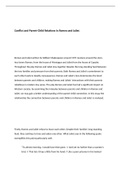Conflict and Parent-Child Relations in Romeo and Juliet.
Romeo and Juliet written by William Shakespeare around 1595 revolves around the story
two lovers Romeo, from the house of Montague and Juliet from the house of Capulet.
Throughout the play Romeo and Juliet stay together Despite the long-standing fued between
the two families and pressure from their parents. Both Romeo and Juliet's commitment to
each other leads to deadly consequences. Romeo and Juliet's love deteriorates the bond
between parents and children, making Romeo and Juliets’ interactions with their parents
rebellious in modern day sense. The play Romeo and Juliet has had a significant impact on
Western society; by examining the interplay between parents and children in Romeo and
Juliet, we may gain a better understanding of the parent-child connection. In this essay the
relationship the connection between parents and children in Romeo and Juliet is analyzed.
Firstly, Romeo and Juliet refuse to leave each other. Despite their families' long-standing
feud, they continue to love and adore one other. What Juliet says in the following quote
exemplifies this point particularly well.
‘Tis almost morning. I would have thee gone. // And yet no further than a wanton’s
bird, // That lets it hop a little from his hand // Like a poor prisoner in his twisted
, gyves// And with a silken thread plucks it back again // So loving-jealous of his
liberty.
(Shakespeare, 2003, II, ii, 179-184)
Juliet compares her bond with Romeo to a child's attachment with their pet bird. Juliet
disobeys her family's hostility toward the Montague family by allowing Romeo into her life.
She intends to keep Romeo as her “pet bird,” claiming that she will not let go of him. Despite
the fact that Juliet is aware that Romeo is a Montague, and she is a Capulet. Juliet maintains
her affair with Romeo without consulting her parents, and she even marries him. As a result,
Juliet rebels against the status quo established by her parents against the Montagues, while
Romeo rebels against the status quo established by his Montague parents. While Romeo is
aware of the animosity between two families, he continues to contact and adore Juliet.
Romeo and Juliet are well aware of the risks of confessing their love, so they meet and marry
in secret. Romeo and Juliet intend to continue their romance even after Romeo is banished
for killing Juliet's cousin Tybalt, as Juliet mentions in the following quote: “O fortune,
fortune! // All men call thee fickle. // If thou art fickle, what dost thou with him // That is
removed for faith? Be fickle, fortune, // For then, I hope, thou wilt not keep him long, // but
send him back.” (Shakespeare, 2003, III, iiiii, 59-63). Romeo also states he has no doubts that
they will meet again (Shakespeare, 2003, III, iiiii, 51-52). Despite the escalating feud with
Juliet's family, Romeo does not want to abandon Juliet. In other words, Romeo and Juliet
refuse to let go of each other.
Secondly, Romeo and Juliet marry. Romeo and Juliet marry and stay married despite the fact
that they are fully aware of the consequences for themselves and their parents. Juliet even
refuses to marry Paris, preferring to remain wedded to Romeo alone, thereby revolting
against her parents. The following quote exemplifies this point.





